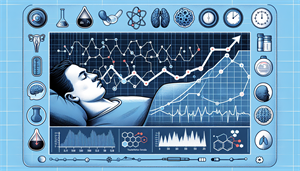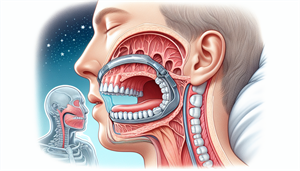
Obstructive Sleep Apnea and Low Testosterone
Obstructive Sleep Apnea (OSA) is a common sleep disorder that affects millions of people worldwide. It disrupts the normal sleep cycle, leading to daytime sleepiness, concentration difficulties, and a host of other health issues. One lesser-known consequence of OSA is its impact on testosterone levels, a crucial hormone for both men’s and women’s health.
The relationship between sleep apnea and low testosterone presents a complex, multifaceted issue with implications for sleep quality, overall health, and quality of life.
Unraveling the intricate relationship between OSA and sleep apnea and low testosterone necessitates a deep understanding of both conditions. This blog post explores this complex interplay, shedding light on the effects of sleep apnea on testosterone production, the impact of low testosterone on sleep quality, and the role body weight plays in this equation.
Key Takeaways
-
Obstructive Sleep Apnea (OSA) has been shown to negatively impact testosterone levels due to sleep fragmentation and reduced REM sleep, with factors such as obesity and age complicating this relationship.
-
Testosterone production is closely tied to the sleep-wake cycle and can be disrupted by OSA, which emphasizes the importance of addressing sleep disorders and maintaining a healthy weight for hormonal balance.
-
Treatment approaches like Continuous Positive Airway Pressure (CPAP) therapy and lifestyle changes are pivotal for managing OSA, yet their effects on testosterone levels vary, necessitating individualized and comprehensive patient treatment plans.
The Interplay Between Obstructive Sleep Apnea and Testosterone Deficiency
Obstructive Sleep Apnea (OSA) and testosterone deficiency are intricately linked conditions. Sleep fragmentation and less REM sleep, both common symptoms of obstructive sleep apnea syndrome, have been shown to decrease testosterone levels. This relationship between OSA and testosterone deficiency is further complicated by factors like obesity and age, which also contribute to decreased testosterone production.
Testosterone Replacement Therapy (TRT) is commonly prescribed for men with low testosterone. However, its use in patients with OSA is a contentious issue.
Studies have shown that TRT can actually worsen symptoms of OSA, leading to increases in the apnea-hypopnea index (AHI), a measure of sleep apnea severity, and decreases in oxygen saturation levels during sleep. Thus, TRT in the context of OSA presents a therapeutic dilemma, highlighting the need for a more nuanced understanding and approach to treatment.
Insights into Testosterone Production During Sleep
Testosterone production follows a certain rhythm, tightly linked to our sleep-wake cycle. At the onset of sleep, testosterone levels begin to increase, reaching their peak around the first REM sleep stage, and then remaining relatively stable throughout the duration of the sleep period. This nocturnal testosterone rhythm is a crucial aspect of hormonal health, ensuring normal physiological functions. However, sleep disorders like OSA can disrupt this natural rhythm.
Severe OSA, characterized by frequent awakenings and less REM sleep, can lead to potential hormonal imbalances, including testosterone deficiency. This disruption in testosterone production can have far-reaching effects on overall health and well-being, emphasizing the importance of addressing sleep apnea and its impact on hormonal health.


